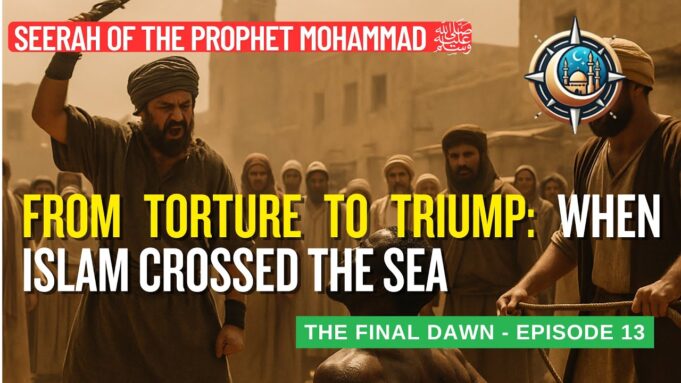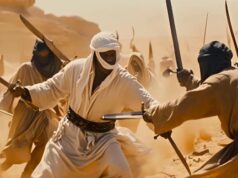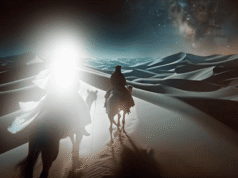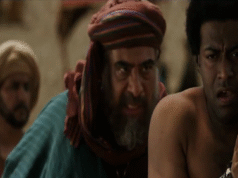Whispers in the Streets of Makkah
The streets of Makkah were no longer calm.
Three years had passed since the first revelation — three years of quiet whispers, secret gatherings, and hearts awakening one by one. The message of Tawheed — to worship Allah alone — had begun to grow roots.
But now, the time for secrecy had ended. A new command came:
And warn your closest kin (Surah Ash-Shu‘ara 26:214).
With that, everything changed.
The Prophet Muhammad (peace be upon him) stood before his family — his uncles, cousins, and kin — and declared the truth. It wasn’t about power, wealth, or pride. It was a call to salvation, a call that pierced through bloodlines, love, and loyalty.
As silence filled the room, only one voice rose — young Ali ibn Abi Talib, still a boy yet already a man of courage.
That day, the seed of faith was planted in public. And soon, it would shake the foundations of Makkah itself.
A Voice from the Mountain
Not long after, the Prophet (peace be upon him) stood upon Mount Safa, overlooking the city that had raised him.
He called out, tribe by tribe — O Banu Fihr, O Banu Adi — until every street echoed with his voice. The people gathered, curious and cautious.
He asked, If I told you an army was coming from behind this mountain, would you believe me?
They answered, Yes. You are Al-Amin, the trustworthy.
Then he declared, Know that I am a warner before a severe punishment. I call you to worship Allah alone and leave the idols you serve.
The crowd stood silent. Truth hung heavy in the air.
Then from among them, his uncle Abu Lahab shouted in anger, Is this why you gathered us? May you be ruined!
He threw dust toward the Prophet — and with that act, mockery began its campaign.
But so did history.
That moment on Mount Safa was the beginning of public da’wah — the call that would change the world forever.
The Council of Fear
The elders of Quraysh were shaken.
Inside Dar al-Nadwah, Makkah’s old council house near the Ka‘bah, the city’s most powerful men gathered — not to discuss trade or travel, but how to stop the truth.
They knew this was no ordinary message. It wasn’t rebellion; it was conscience.
Among them sat Abu Jahl, whose arrogance blinded him; Utbah ibn Rabi‘ah, wise but fearful of change; Al-Walid ibn al-Mughira, proud and calculating; and Suhayl ibn Amr, the smooth-tongued orator who could turn lies into warnings.
They debated what to call Muhammad (peace be upon him).
Madman? No — his words were calm.
Poet? No — they carried no rhythm of men.
Sorcerer? Perhaps — his message touched hearts and divided families.
And so, they agreed to call him a sorcerer and spread fear to every visitor who entered Makkah.
The war of words had begun.
When Lies Couldn’t Silence Truth
During the pilgrimage season, Suhayl ibn Amr stood before crowds of travelers and shouted warnings:
Beware of a man in our city whose words are like magic. He divides families and confuses minds.
People listened. Some turned away in fear. Others… became curious.
Because truth has a strange power — the more it is fought, the more people want to hear it.
The Voice That Defied Fear
One evening, in the small gathering place known as Dar al-Arqam, a group of early Muslims discussed a dangerous idea:
The Quraysh mock the Qur’an without understanding it, said one companion. Someone must recite it aloud at the Ka‘bah itself.
No one dared — except one man.
Abdullah ibn Masud, a shepherd with no tribe or wealth, stood and said, I will recite it. Allah will protect me.
At dawn, when Quraysh gathered in the courtyard of the Ka‘bah, Ibn Masud stepped forward. His voice rose:
The Most Merciful,
Taught the Qur’an,
Created man…
The verses of Surah ar-Rahman flowed like waves across the air. People stopped. For a moment, even his enemies listened.
Then the silence broke. Fists, stones, and sandals struck him until blood covered his face. But he didn’t stop — not until the recitation was complete.
When he returned, battered but smiling, he said, The enemies of Allah were never more insignificant in my eyes than they are now. I would do it again tomorrow if you ask me to.
The courage of one man became the echo of truth in Makkah’s heart.
Faith Beneath the Whip
Some believers had no tribe to protect them — no Abu Talib to shield them.
Among them was a small family whose names would forever be written in gold: Yasir, Sumayyah, and their son Ammar.
They were tied under the burning sun, beaten day after day. Their crime? Believing in one God.
The Prophet (peace be upon him) would pass by and whisper through his tears, Be patient, O family of Yasir. Your meeting place is Paradise.
But the torture grew unbearable.
Sumayyah, frail but unbroken, refused to deny her Lord.
Abu Jahl’s spear struck her — and she became the first martyr in Islam.
Yasir soon followed.
And Ammar, forced under torture to utter words against his faith, wept in pain until a revelation came:
Whoever disbelieves in Allah after belief — except one who is forced while his heart remains firm in faith — there is no sin upon him (Surah An-Nahl 16:106).
Even now, their story reminds us — sometimes faith doesn’t mean ease.
It means endurance.
Across the Sea: A Refuge of Hope
As persecution worsened, the Prophet (peace be upon him) made a decision that would save lives and spread light beyond Makkah.
He told a small group of believers to migrate to Abyssinia, a land ruled by a just Christian king, Negus (al-Najashi).
It was the first migration in Islam — a journey of faith, not escape.
Among them were Uthman ibn Affan and Ruqayyah, the Prophet’s daughter. They left their homes and wealth behind, carrying only belief.
Far from the sands of Makkah, they found safety.
The Qur’an was now being recited across the sea — proof that Islam could not be contained by borders or oppression.
Cracks in Quraysh
The Quraysh had called him a madman, a poet, a sorcerer. But none of it fit.
Some of their own hearts began to waver.
Men like Umar ibn al-Khattab, fierce and proud, started to question.
How could someone so honest, so dignified, be wrong?
How could words so pure be lies?
The storm in Makkah was not just around them — it was inside them.
The Dawn Beyond the Storm
They mocked. They tempted. They tortured.
But nothing could extinguish the light of Islam.
The Prophet (peace be upon him) continued to preach with patience. His followers endured with tears, scars, and hope.
And soon, two of Quraysh’s strongest men — Hamzah ibn Abd al-Muttalib and Umar ibn al-Khattab — would rise from that storm to strengthen the very faith they once opposed.
The storm of Makkah was fierce.
But it was not the end.
It was only the beginning —
The dawn before the world would change forever.
Why This Story Still Matters
The world hasn’t changed as much as we think.
Truth is still uncomfortable.
Faith is still tested.
And courage still asks us to stand when it’s easier to stay silent.
The story of Makkah is not just history — it’s a mirror.
Every generation faces its own storm.
And every believer must decide:
Will I stay silent, or will I stand, like they did, when the world turns away?










